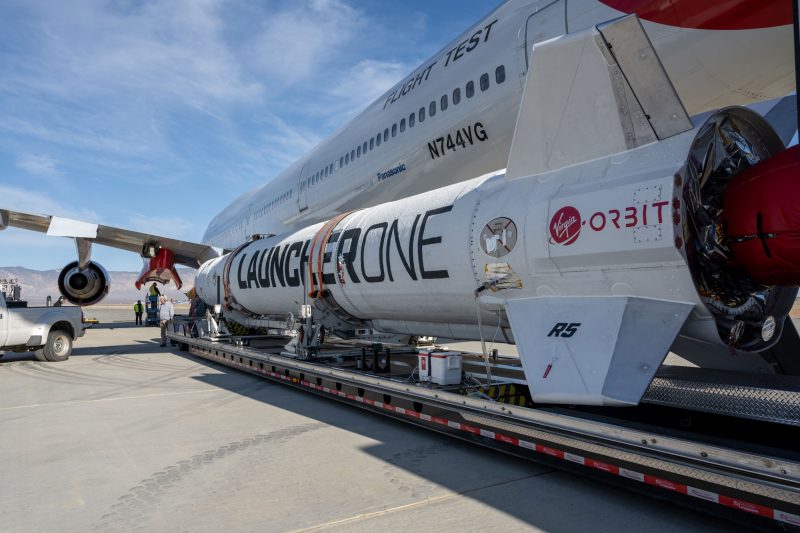
‘Anomaly’ foils Virgin Orbit’s premiere UK launch
Billed as an historic first orbital launch from the UK, Cosmic Girl – a modified Boeing 747 emblazoned with the Virgin Orbit logo and carrying a two-stage rocket under its portside wing – took to the nighttime sky on Monday (January 9, 2023) from Spaceport Cornwall in Newquay, UK. Unfortunately, the milestone mission went disappointingly wrong, as the LauncherOne rocket malfunctioned, and the payload of satellites it carried failed to reach their intended orbits.
Second failure for Virgin Orbit
The launch was Virgin Orbit’s sixth mission and the second failure to deliver a payload.
The 747 took off at 10:01 p.m. (22:01 UTC) and climbed to an altitude of about 50,000 feet (15 km). About an hour after takeoff, Cosmic Girl dropped the orbital rocket, which ignited successfully, Virgin Orbit reported:
The rocket then ignited its engines, quickly going hypersonic and successfully reaching space. The flight then continued through successful stage separation and ignition of the second stage. However, at some point during the firing of the rocket’s second stage engine and with the rocket traveling at a speed of more than 11,000 miles (6,800 km) per hour, the system experienced an anomaly, ending the mission prematurely.
The group of satellites it carried did not reach their intended orbits. Cosmic Girl and its four-person crew returned safely to Spaceport Cornwall, which served from the 1930s until 2019 as Newquay Airport.
Stock drops after rocket fails
While CEO Dan Hart said his staff is “mindful” it failed to put its customers satellites into orbit, the company’s press release played up Virgin Orbit’s hope for future success:
The effort behind the flight brought together new partnerships and integrated collaboration from a wide range of partners, including the UK Space Agency, the Royal Air Force, the Civil Aviation Authority, the US Federal Aviation Administration, the National Reconnaissance Office and more, and demonstrated that space launch is achievable from UK soil.
Investors are less enthusiastic. CNBC reports the company’s stock price continued to fall, losing another 20 percent of its value in trading the day after the failure:
Shares of Virgin Orbit dropped about 20% in early trading Tuesday, from its previous close of $1.93 (€1.80) a share. The stock has fallen steadily since going public via a SPAC at near $10 (€9.32) a share.
CNBC also reported the company missed reaching its operational goal for last year, and that is running short of cash:
The company conducted just two launches in 2022, short of the forecast for four to six missions that Virgin Orbit gave at the beginning of last year. At the end of the third quarter, Virgin Orbit had $71.2 million in cash on hand, and raised an additional $25 million from Richard Branson’s Virgin Group, an existing major shareholder, in the middle of the fourth quarter.
Launches from anywhere!
While the technical failure stymied the first attempt to get a payload to orbit from the soil of the UK, Virgin Orbit’s method – air launching – has been used successfully for decades by combat aircraft. Once the kinks are worked out, LauncherOne could theoretically carry satellites to orbit from any airport on the planet that can accommodate a 747.
The previous four successful missions – and its other failure – all flew from the US Mojave Air and Space Port in California.
Monday’s mission carried an international assortment of at least nine satellites (or more if secret spy satellites were onboard). Among small-scale satellites flying on the Start Me Up mission – named after the 1981 Rolling Stones hit of the same name – were payloads for the US National Reconnaissance Office (NRO) and the UK’s Ministry of Defence, NASASpaceflight.com reported:
The payload announced for Monday’s launch consists of nine small satellites, although with the involvement of the NRO and several other military organizations, additional classified payloads cannot be ruled out. The primary payload was Prometheus-2, a pair of CubeSats that was to conduct a technology demonstration mission for the Ministry of Defence (MoD) and allied governments. Other payloads included other missions for British government and private organizations, most in collaboration with international partners, as well as a Polish CubeSat and the first satellite for the Sultanate of Oman.
Despite the failure of the latest launch attempt, the United Kingdom hopes its partnership with Virgin Orbit will place the country on the cutting edge of European aerospace efforts as it expands its launch capability over the next decade. Matt Archer, director of commercial spaceflight at the UK Space Agency, noted that sense of optimism, as well as underlining the difficulties inherent to spaceflight:
While this result is disappointing, launching a spacecraft always carries significant risks. Despite this, the project has succeeded in creating a horizontal launch capability at Spaceport Cornwall, and we remain committed to becoming the leading provider of commercial small satellite launch in Europe by 2030, with vertical launches planned from Scotland.
Bottom line: Virgin Orbit’s premiere UK launch failed on Monday, January 9, 2023, as the rocket malfunctioned, and the satellites failed to reach their intended orbits.











